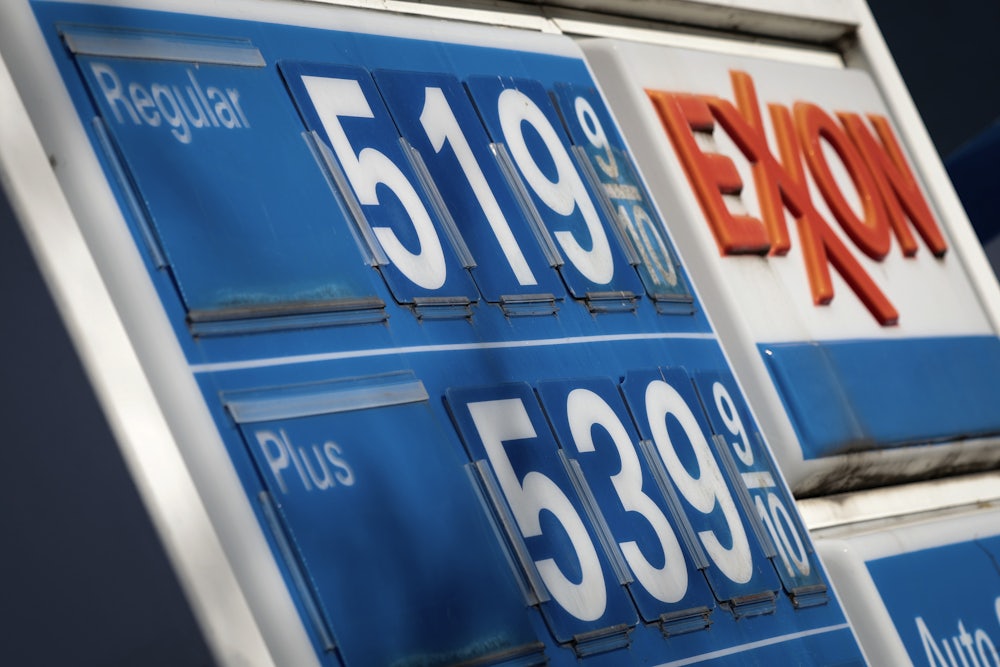Democrats in Congress have introduced a proposal to give you another stimulus check of hundreds of dollars. And I’m guessing you probably don’t know about it.
It’s true. Not only that, but the proposal for this fourth stimulus check—unlike the three prior stimulus bills—is actually paid for, which should be appealing to the deficit hawks among us.
So who pays for the stimulus check? Big oil companies.
Here are the details. Senator Sheldon Whitehouse and a dozen of his colleagues announced on March 10 that they were introducing legislation that would impose a windfall profits tax on oil companies. (There’s also a House companion.) If it’s enacted, a quarterly tax would be applied to large oil companies that produce or import at least 300,000 barrels of oil per day. The senators estimate that when oil is at $120/barrel, the tax would generate $45 billion in revenue, which would then translate into a $360 stimulus check for American families.
The bill is fundamentally moderate in important ways. As already mentioned, it’s paid for. Second, it isn’t as comprehensive as many of us would like. It only targets windfalls gleaned from oil companies in their most recent profit-taking, not from the hundreds of billions they’ve reaped in recent years during the pandemic. And lastly, the amount is modest: a per-barrel tax of half the difference between the current price of a barrel of oil and the pre-pandemic average price per barrel. Therefore, it concedes that the oil companies will continue to make profits, just fewer profits.
Nevertheless, this legislative proposal, which has historical precedent, deserves more attention and support. It delivers the right political medicine for the moment and speaks to the anger many Americans are feeling about the current state of the economy. The public understands that when Biden and Democrats injected stimulus checks into their pockets last year, large powerful corporations came around to steal them back in the form of predatory pricing. And so the public is rightly asking: What is the government going to do about it?
The current price gouging by oil companies is obscene. Take a look at the facts. Historically, when the price of crude oil was at the same levels it is currently (roughly $100/barrel), the price of gas was actually a dollar cheaper per gallon at the pump. And we know that when gas prices rise, the most painful burdens are felt by working-class people living paycheck to paycheck.
Big Oil hates the new proposal. The American Petroleum Institute—the lobbying arm for oil companies—complained in a press release that the bill is unfair “finger pointing.” Senator Joe Manchin, a prominent defender of the fossil fuel industry, echoed that he worries about “beating people up.”
Of course, some Democrats don’t love fights against oil companies—or even fights in general. But there is no progress without struggle, and now is a time of major struggle for America’s working families. As voters head to the polls in a few months, they’re going to be asking a basic question of which party is fighting for them.
To its credit, the White House is leaning into this fight. President Biden stated plainly, “Oil and gas companies shouldn’t pad their profits at the expense of hardworking Americans.” At a recent press conference, press secretary Jen Psaki attacked oil and gas’s windfall profits by explaining, “Too many of these companies, in our view, are making the calculated decision of returning money to investors and shareholders through buybacks and dividends.” Translation: Oil companies are enriching wealthy investors by sucking dollars out of the pockets of working people.
I’ve written previously about the need for Democrats to adopt corporate greed as a key message and to take some bold actions to address it. And while I continue to offer that critique and feel strongly that they are generally not stepping up to the moment, it’s important to laud movement in the right direction. We need more actions like this windfall profits tax.
But as with any time we suggest a fight against corporate power, there are going to be those who instead offer alternative paths of accommodation. And thus, you have some Democrats and Republicans proffering bad ideas like a gas tax holiday. Not only would such a proposal offer inadequate relief to consumers, a gas tax holiday would actually be a gift to oil companies because it implicitly endorses more driving, particularly of higher-emitting vehicles, and does very little to curtail the profiteering that’s driving the price. Moreover, suspending the gas tax would impair funding for our nation’s infrastructure.
And obviously, we don’t need to be reminded that the product we’re talking about here is making life increasingly uninhabitable on this planet, and therefore, if we’re going to be incentivizing anything through government policy, it should be moving us more quickly down the road of energy transformation.
To be fair, a broader populace—desperate for some relief—is generally supportive of the tax holiday. So let’s give them the relief that makes the most sense for our national priorities.
Focus on the stimulus checks could be a powerful argument in going up against the one-man filibuster of Joe Manchin. In late 2020 and in early 2021, Manchin opposed stimulus checks, only to see the incredible public support for them in his own state. Manchin ultimately yielded to popular demand both times. We should try to make it happen again.
Let’s lean into the fight against profiteering oil companies. And let’s deliver another wildly popular and much-needed stimulus check to working Americans.






